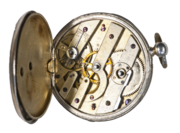| Deism |
|---|
| Part of a series on |
| Intelligent design |
|---|
 |
| Concepts |
| Movement |
| Campaigns |
| Authors |
| Organisations |
| Reactions |
|
|
| Creationism |
The watchmaker analogy or watchmaker argument is a teleological argument, an argument for the existence of God. In broad terms, the watchmaker analogy states that just as it is readily observed that a watch (e.g.: a pocket watch) did not come to be accidentally or on its own but rather through the intentional handiwork of a skilled watchmaker, it is also readily observed that nature did not come to be accidentally or on its own but through the intentional handiwork of an intelligent designer. The watchmaker analogy originated in natural theology and is often used to argue for the pseudoscientific concept of intelligent design. The analogy states that a design implies a designer, by an intelligent designer, i.e. a creator deity. The watchmaker analogy was given by William Paley in his 1802 book Natural Theology or Evidences of the Existence and Attributes of the Deity.[1] The original analogy played a prominent role in natural theology and the "argument from design," where it was used to support arguments for the existence of God of the universe, in both Christianity and Deism. Prior to Paley, however, Sir Isaac Newton, René Descartes, and others from the time of the Scientific Revolution had each believed "that the physical laws he [each] had uncovered revealed the mechanical perfection of the workings of the universe to be akin to a watch, wherein the watchmaker is God."[2]
The 1859 publication of Charles Darwin's book on natural selection put forward an alternative explanation to the watchmaker analogy, for complexity and adaptation. In the 19th century, deists, who championed the watchmaker analogy, held that Darwin's theory fit with "the principle of uniformitarianism—the idea that all processes in the world occur now as they have in the past" and that deistic evolution "provided an explanatory framework for understanding species variation in a mechanical universe."[3]
When evolutionary biology began being taught in American high schools in the 1960s, Christian fundamentalists used versions of the argument to dispute the concepts of evolution and natural selection, and there was renewed interest in the watchmaker argument. Evolutionary biologist Richard Dawkins referred to the analogy in his 1986 book The Blind Watchmaker when explaining the mechanism of evolution. Others, however, consider the watchmaker analogy to be compatible with evolutionary creation, opining that the two concepts are not mutually exclusive.[citation needed]